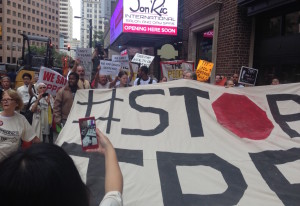 Despite the heroic efforts of activists on-the-ground and countless others throughout the world, trade ministers meeting in Atlanta announced on Monday, October 5, 2015, that they had struck a behind-closed doors deal on the Trans-Pacific Partnership (TPP). As such, it’s now up to us to convince Congress to vote down an agreement that’s bad for the economy, the environment and public health.
Despite the heroic efforts of activists on-the-ground and countless others throughout the world, trade ministers meeting in Atlanta announced on Monday, October 5, 2015, that they had struck a behind-closed doors deal on the Trans-Pacific Partnership (TPP). As such, it’s now up to us to convince Congress to vote down an agreement that’s bad for the economy, the environment and public health.
For the better part of a decade, millions of Americans have been telling the administration what sorts of provisions the TPP would need to ensure it benefits working families, instead of just corporate profits.
Over all that time, the U.S. Trade Representative has granted hundreds of well-connected corporate lobbyists access to TPP texts, but has refused to tell the American people what they’ve been proposing in our names. As a result, we’ve had corporations guiding secret negotiations with human rights violators like Malaysia, where millions are victims of human trafficking, and Vietnam, where you can go to jail for requesting better working conditions — while the American people have been shut out of the process.
Par for the course, the exact terms of the TPP deal agreed to in Atlanta are still being kept secret. Text will eventually be shared with Congress, though, before any vote — and, eventually, even you and I will finally get to see an official copy.
The benchmarks we must demand Congress consider include:
Does the TPP contain labor and environmental standards, rules of origin and currency safeguards strong enough to protect human rights abroad and good-quality jobs here at home — or will it ship jobs overseas and reduce wages for U.S. workers?
Does the TPP establish a floor, rather than a ceiling, when it comes to food and product safety — or will it expand imports from countries where food is often found to contain banned toxic chemicals?
Does the TPP make medicine more affordable — or will it increase the price of prescription drugs for seniors, veterans and others by enabling big pharmaceutical companies to prevent the sale of life-saving generic medications?
Does the TPP increase oversight of banks, insurance companies and hedge funds — or will it prevent governments from enacting commonsense finanical reforms to prevent future finanical crises?
Does the TPP contribute towards a sustainable global economy — or will it accelerate global climate change?
Based on how the TPP was negotiated, as well as the smattering of leaked texts published by our coalition and others, I suspect we already know the answers to those questions.
We have consistently demanded a “fair deal or no deal” on trans-Pacific trade. Given that the completed TPP agreement is unlikely to be fair to anyone but CEOs and Wall Street executives, it’s time for Congress to speak up.




